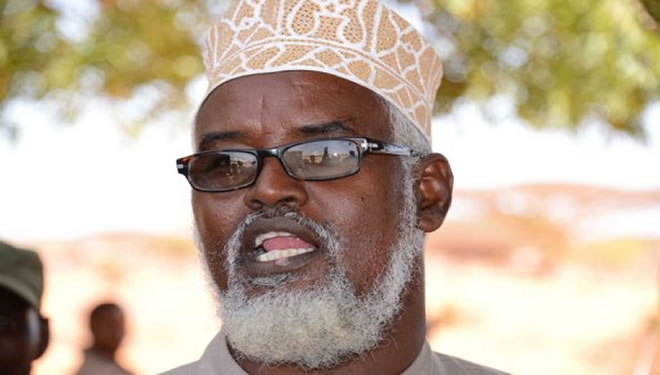
Ahmed Madobe speaks in Kismayo on February 28, 2013 (AFP, Mohamed Abdiwahab)

Monday, June 10, 2013
Heavy fighting broke out Friday when the Ras Kamboni militia of Madobe -- recently self-appointed "president" of the southern Jubaland region -- battled forces loyal to Iftin Hassan Basto, another leader claiming to be president.
"The situation is quiet now and most parts of the town are controlled by Madobe's men," said resident Abdulahi Mire, adding that rival forces had been forced outside town, but "are not far away".
Several rival factions claim ownership of Kismayo, a former stronghold of the Al-Qaeda-linked Shebab where Kenyan troops in an African Union force are now based.
The Kenyan troops, who invaded Somalia in 2011, back Madobe's control of the strategic and economic hub, but neither the title of "president" nor the region of Jubaland is recognised by the weak central government in Mogadishu.
"Business is slowly returning to normal, we can't hear gunfire today... we hope the situation stays calm like this," said Ahmed Moyale, another resident.
Jubaland lies in the far south of Somalia, bordering both Kenya and Ethiopia, and control is split between multiple forces including clan militia, the Shebab and Kenyan and Ethiopian soldiers.
Jubaland joins other semi-autonomous regions of the fractured Horn of Africa nation, including Puntland in the northeast -- which wants autonomy within a federation of states -- and Somaliland in the northwest, which fiercely defends its self-declared independence.
Somali President Hassan Sheikh Mohamud, who holds little sway in the port city, said all sides should end the fighting.
"The time for fighting is over," he said in a statement. "We must unite and seek to resolve our differences peacefully, we must unite for the fight against Al-Shebab."
The Kenyan and Somali presidents met last week, discussing among other issues Nairobi's role in Jubaland, which has a lucrative charcoal industry, fertile farmland and potential offshore oil and gas deposits.
Many eye the economic, strategic and political profits of the region.
Kenya views the region as a key buffer zone to protect its borders, but in Jubaland, it has ended up backing a warlord opposing the central government it is mandated -- and funded by the UN and European Union -- to support.
In the past two years, AU troops have wrested town after town from the Shebab, hauling down their black Islamist banners and raising Somalia's flag.
But asserting the authority of the central government -- which until recently controlled just a few blocks of the capital Mogadishu -- is a far harder task.
Analysts warn the rivalries risk threatening the fragile progress made in Somalia.
"The crisis...threatens to destabilise the entire country if not properly dealt with," the Heritage Institute for Policy Studies, a Somali research group, wrote in a recent report, warning the clashes risk "creating an opening for Al-Shebab to reassert control in recently recovered areas."
Source: AFP